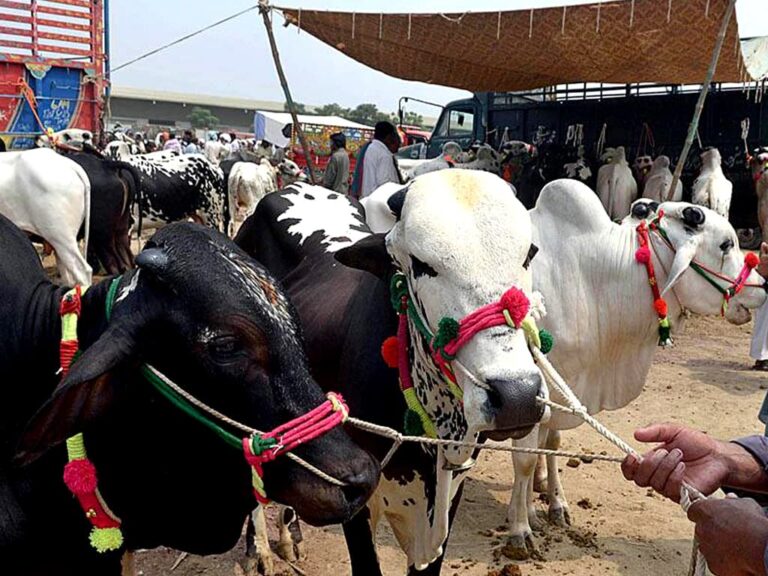
At least five cases have been registered across Punjab against the minority Ahmadi community for sacrificing animals on Eidul Azha, according to reports.
The complaints have been registered under Section 298-C of the Pakistan Penal Code (PPC). The section elaborates on the penalty for a person of the Ahmadi group calling themselves a Muslim or preaching or propagating their faith.
Two of the cases have been registered at the Saddar Gojra police station in Toba Tek Singh while one each has been registered at the Saddar Shahkot police station in Nankana Sahib, Roshanwala police station in Faisalabad and the Badami Bagh police station in Lahore.
This comes despite a 2022 judgement of the Supreme Court, ruling that obstructing non-Muslims from practising their religion within the confines of their place of worship was against the Constitution.
One of the two FIRs registered in Toba Tek Singh alleged that on the second day of Eid, the complainant and others saw Ahmadi citizens preparing to sacrifice animals and tried to stop them from “committing a crime”.
The complainant said they went ahead, claiming that the act hurt the sentiments of Muslims. It also called for taking strict action against the persons in question and for recovering the meat, hide and tools used to sacrifice the animal.
A similar FIR was registered at the same police station. It alleged that on the second day of Eid, two Ahmadi citizens were sacrificing animals.
The FIR registered in Nankana Sahib was registered on the complaint of an assistant sub-inspector on the first day of Eidul Azha. The complainant alleged that he had received a phone call from someone saying that people from the Ahmadi community were sacrificing animals in the village, which led him to go and investigate and claimed that he found the Ahmadi community sacrificing animals.
The FIR registered in Faisalabad on the complaint of a Tehreek-e-Labbaik Pakistan (TLP) worker on the third day of Eid claimed that he saw a member of the Ahmadi community sacrificing animals and subsequently called the police helpline. When officials came, the person in question fled the scene, the complainant alleged, calling for action to be taken against them.
The fifth FIR registered in Lahore said several members of the Ahmadi community in his neighbourhood were sacrificing animals.
A spokesperson for the community, Aamir Mehmood, in a statement cited last year’s decision by the SC and questioned the basis on which police had registered cases against members of the community. He called for dismissing the “baseless” cases, adding that the community had spent this year’s Eidul Azha “in fear”.
Earlier, in a letter to the Punjab Home Department, the Lahore High Court Bar Association maintained that on Eidul Azha, the adoption of Islamic rites of Eid prayers and sacrifice of animals were “exclusively only for Muslims”.
The letter, dated June 22, asked the Home Department to issue directives for SHOs to take “all necessary and requisite preemptive and preventive measures to bound and restrain illegal use of Shaair-i-Islami (gathering for Eid prayer and qurbani)” on all three days of Eidul Azha.
It further stated that the officers should be warned of “strict/stern departmental action” in case of non-compliance and that legal action should be initiated against relevant individuals from the Ahmadi community and other organisers of such gatherings under Sections 298-C and 298-B of the PPC in such a case as well.
Following these complaints and the bar’s letter, at least one district police officer (DPO) in Punjab asked his subordinates to hold meetings with individuals of the Ahmadi community in their respective areas and get stamp papers from them as a surety that they will not sacrifice animals on Eidul Azha.
SC JUDGEMENT
A 2022 judgement of the Supreme Court, penned by Justice Mansoor Ali Shah, stated that “to deprive a non-Muslim (minority) of our country from holding his religious beliefs, to obstruct him from professing and practicing his religion within the four walls of his place of worship is against the grain of our democratic Constitution and repugnant to the spirit and character of our Islamic Republic”.
The written order stated: “It also deeply bruises and disfigures human dignity and the right to privacy of a non-Muslim minority, who like all other citizens of this country enjoy the same rights and protections under the Constitution.
“Bigoted behaviour towards our minorities paints the entire nation in poor colour, labelling us as intolerant, dogmatic and rigid. It is time to embrace our constitutional values and live up to our rich Islamic teachings and traditions of equality and tolerance.”
The judgement was issued in connection with a case registered against an individual from an Ahmadi community for “styling their place of worship as a mosque and displaying Shaair-i-Islam on the walls inside their place of worship”.